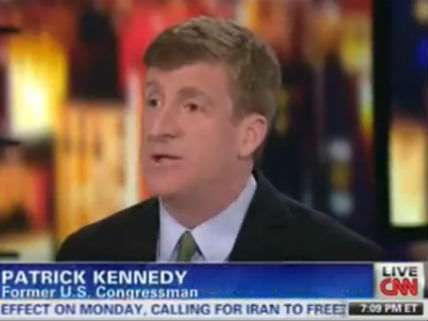Anti-Pot Activist Concedes Marijuana Is Safer Than Alcohol

Dan Riffle of the Marijuana Policy Project points out that Patrick Kennedy, chairman of the anti-pot group Project SAM, let this slip during his recent CNN debate with my colleague Nick Gillespie:
I agree with the president. Alcohol is more dangerous.
That is not what Kennedy said after Obama made that comparison in an interview with The New Yorker. Here is what Kennedy said then:
We take issue with the President's comparisons between marijuana and alcohol, and we strongly encourage him—a president who has, on many occasions, championed rigorous science—to work closely with his senior drug policy advisors and scientists, who fully acknowledge the growing world body of science showing the harms of marijuana use to individuals and communities.
As I pointed out, Kennedy never actually said Obama's statement was inaccurate (as opposed to inconvenient). But he strongly implied that the president needed to get his facts straight if he was going around saying that marijuana is safer than alcohol. Yet here is Kennedy, the day after Project SAM issued that press release, saying exactly the same thing.
You can concede that marijuana is safer than alcohol and still defend marijuana prohibition—just not very convincingly. Because if you concede that marijuana is safer than alcohol, then you concede that the distinctions drawn by our drug laws—distinctions that send people to prison—are essentially arbitrary. Alcohol is legal and marijuana is not for historically and culturally contingent reasons that have nothing to do with the relative hazards of these drugs. Kennedy acknowleges as much but, like Washington Post columnist Ruth Marcus, argues that marijuana should be illegal because it is illegal.
Although Kennedy seems to believe that repealing alcohol prohibition was a mistake, he figures that bringing it back would be politically impractical, and he worries that resolving the inconsistency by repealing marijuana prohibition will result in more drug-related harm. That is not necessarily true, depending on substitution effects and other factors, and it dodges the question of whether such an uncertain calculus can justify the burdens imposed by prohibition. Even if we accept Kennedy's paternalistic premise, can it be fair to treat suppliers of one drug as criminals while treating suppliers of a more dangerous one as legitimate businessmen? Should people lose their freedom for reasons that Kennedy concedes are arbitrary?


Show Comments (139)